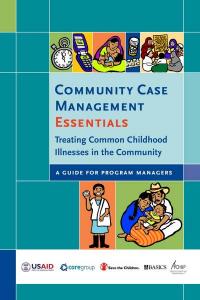Community Case Management of Childhood Illness
Over 7.5 million under-five children died in 2010 and three-quarters of all those deaths are mainly due to preventable causes: neonatal conditions, pneumonia, diarrhea, malaria, and measles. Many of these deaths could be averted by known, affordable, low-technology interventions such as antibiotics, oral rehydration solution and zinc supplements, and anti-malarials. Community case management (CCM) is a strategy to deliver these lifesaving curative interventions for the most common childhood illnesses, in particular where there is little access to facility-based services. CCM does not “stand alone.” The best efforts improve the skills of existing cadres of community health workers (CHWs) so they can deliver the curative interventions to sick children in their communities and also ensure strong links to existing health facilities. A good CCM strategy:
- Addresses access to, quality of, and demand for CCM services;
- Seeks to ensure that CCM has the support of decision-makers, health care providers, and community members; and
- Is put into action in tandem with improvements in the health system.
This guide methodically documents what is known about CCM and how to make it work. First, health program managers are introduced to the basics. Then, CCM Essentials walks its readers through the process of designing and managing a high-quality CCM program. The ultimate result: lives of newborns, infants and children saved around the world.
Last modified: July 23, 2021
Language: English

